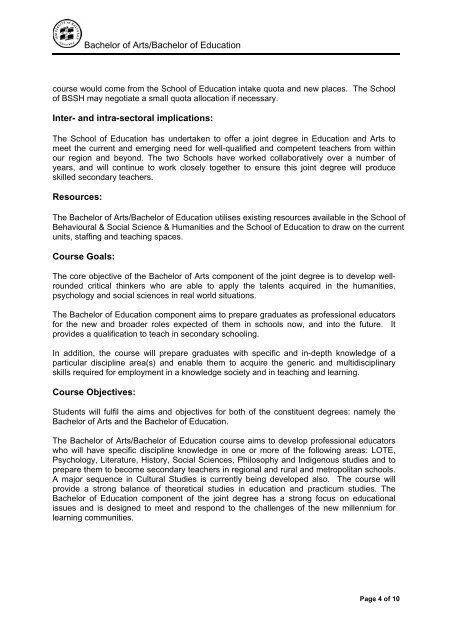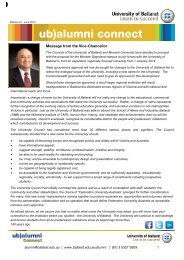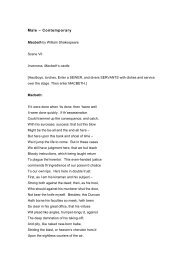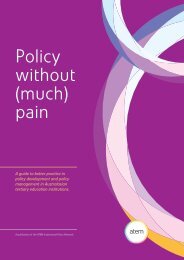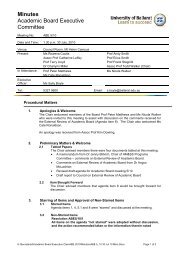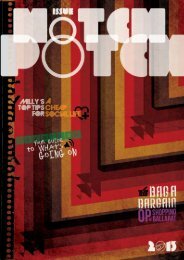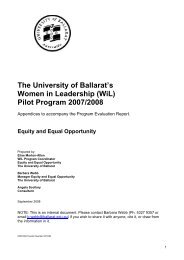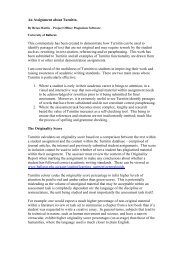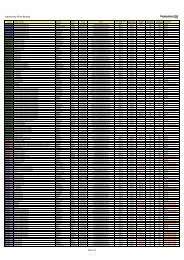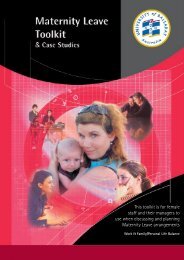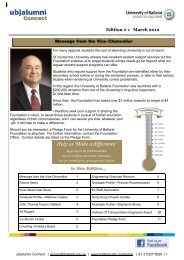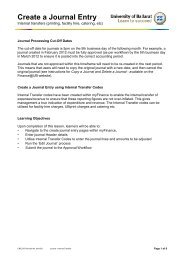Bachelor of Arts/Bachelor of Education
Bachelor of Arts/Bachelor of Education
Bachelor of Arts/Bachelor of Education
Create successful ePaper yourself
Turn your PDF publications into a flip-book with our unique Google optimized e-Paper software.
<strong>Bachelor</strong> <strong>of</strong> <strong>Arts</strong>/<strong>Bachelor</strong> <strong>of</strong> <strong>Education</strong>course would come from the School <strong>of</strong> <strong>Education</strong> intake quota and new places. The School<strong>of</strong> BSSH may negotiate a small quota allocation if necessary.Inter- and intra-sectoral implications:The School <strong>of</strong> <strong>Education</strong> has undertaken to <strong>of</strong>fer a joint degree in <strong>Education</strong> and <strong>Arts</strong> tomeet the current and emerging need for well-qualified and competent teachers from withinour region and beyond. The two Schools have worked collaboratively over a number <strong>of</strong>years, and will continue to work closely together to ensure this joint degree will produceskilled secondary teachers.Resources:The <strong>Bachelor</strong> <strong>of</strong> <strong>Arts</strong>/<strong>Bachelor</strong> <strong>of</strong> <strong>Education</strong> utilises existing resources available in the School <strong>of</strong>Behavioural & Social Science & Humanities and the School <strong>of</strong> <strong>Education</strong> to draw on the currentunits, staffing and teaching spaces.Course Goals:The core objective <strong>of</strong> the <strong>Bachelor</strong> <strong>of</strong> <strong>Arts</strong> component <strong>of</strong> the joint degree is to develop wellroundedcritical thinkers who are able to apply the talents acquired in the humanities,psychology and social sciences in real world situations.The <strong>Bachelor</strong> <strong>of</strong> <strong>Education</strong> component aims to prepare graduates as pr<strong>of</strong>essional educatorsfor the new and broader roles expected <strong>of</strong> them in schools now, and into the future. Itprovides a qualification to teach in secondary schooling.In addition, the course will prepare graduates with specific and in-depth knowledge <strong>of</strong> aparticular discipline area(s) and enable them to acquire the generic and multidisciplinaryskills required for employment in a knowledge society and in teaching and learning.Course Objectives:Students will fulfil the aims and objectives for both <strong>of</strong> the constituent degrees: namely the<strong>Bachelor</strong> <strong>of</strong> <strong>Arts</strong> and the <strong>Bachelor</strong> <strong>of</strong> <strong>Education</strong>.The <strong>Bachelor</strong> <strong>of</strong> <strong>Arts</strong>/<strong>Bachelor</strong> <strong>of</strong> <strong>Education</strong> course aims to develop pr<strong>of</strong>essional educatorswho will have specific discipline knowledge in one or more <strong>of</strong> the following areas: LOTE,Psychology, Literature, History, Social Sciences, Philosophy and Indigenous studies and toprepare them to become secondary teachers in regional and rural and metropolitan schools.A major sequence in Cultural Studies is currently being developed also. The course willprovide a strong balance <strong>of</strong> theoretical studies in education and practicum studies. The<strong>Bachelor</strong> <strong>of</strong> <strong>Education</strong> component <strong>of</strong> the joint degree has a strong focus on educationalissues and is designed to meet and respond to the challenges <strong>of</strong> the new millennium forlearning communities.Page 4 <strong>of</strong> 10


